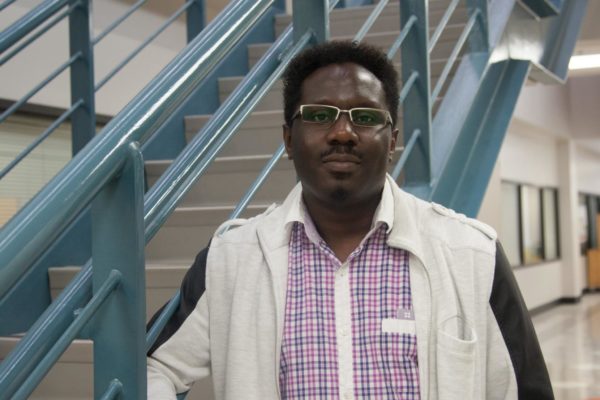AUSTIN, Texas — The Gordon and Betty Moore Foundation has selected Deji Akinwande, associate professor in the Cockrell School of Engineering at The University of Texas at Austin, as one of its five inaugural Moore Inventor fellows.
The new fellowship program recognizes distinguished early-career innovators at universities across the U.S. and supports research efforts that have a high potential to accelerate progress in science, environmental conservation and patient care. Fellows will receive $825,000 each over three years to drive their inventions forward, including $50,000 per year from their home institutions.
Akinwande was selected because of his work creating an atomically thin 2-D silicon structure known as silicene, which could provide a tenfold increase in energy efficiency for integrated circuits such as computer chips. His goal is to make the world’s thinnest silicon transistor, which would extend the reach of Moore’s Law and scale silicon technology to even smaller dimensions.
“We are investing in promising scientist problem-solvers with a passion for inventing — like Gordon Moore himself,” said Harvey V. Fineberg, president of the Gordon and Betty Moore Foundation. “By providing support to these early-career researchers, we can give them the freedom to try out new ideas that could make a real and positive difference.”
The inaugural Moore Inventor Fellows competition drew from early-career researchers at Association of American Universities member institutions as well as 15 additional institutions from the top 50 medical schools funded by the National Institutes of Health.
In addition to Akinwande, the Moore Foundation selected Shane Ardo from the University of California, Irvine; Xingjie Ni from Penn State University; Joanna Slusky from the University of Kansas; and Mona Jarrahi from the University of California, Los Angeles. Beginning with these five fellows in 2016, the foundation plans to invest nearly $34 million to support a total of 50 Moore Inventor fellows in the next 10 years.
In 1965, Gordon Moore predicted the doubling of components on an integrated circuit every 18 months. From careful observation of an emerging trend, Moore extrapolated that computing would dramatically increase in power, and decrease in relative cost, at an exponential pace. This observation helped fuel the technological advancement and acceleration we have seen during the past 50 years. With the creation of the Moore Inventor Fellows program, the foundation hopes to enable breakthroughs that accelerate progress during the next 50 years.
Akinwande is an associate professor in the Department of Electrical and Computer Engineering and a recipient of the 2016 Presidential Early Career Award for Scientists and Engineers, the highest honor bestowed by the United States government on scientists and engineers in the early stages of their research careers. He is also a past recipient of fellowships from the Ford Foundation and the Alfred P. Sloan Foundation.
Additionally, Akinwande has been awarded the inaugural IEEE Nano Geim and Novoselov Graphene Prize, the National Science Foundation CAREER award, the Army and Defense Threat Reduction Agency’s Young Investigator award and the 3M Nontenured Faculty Award.




